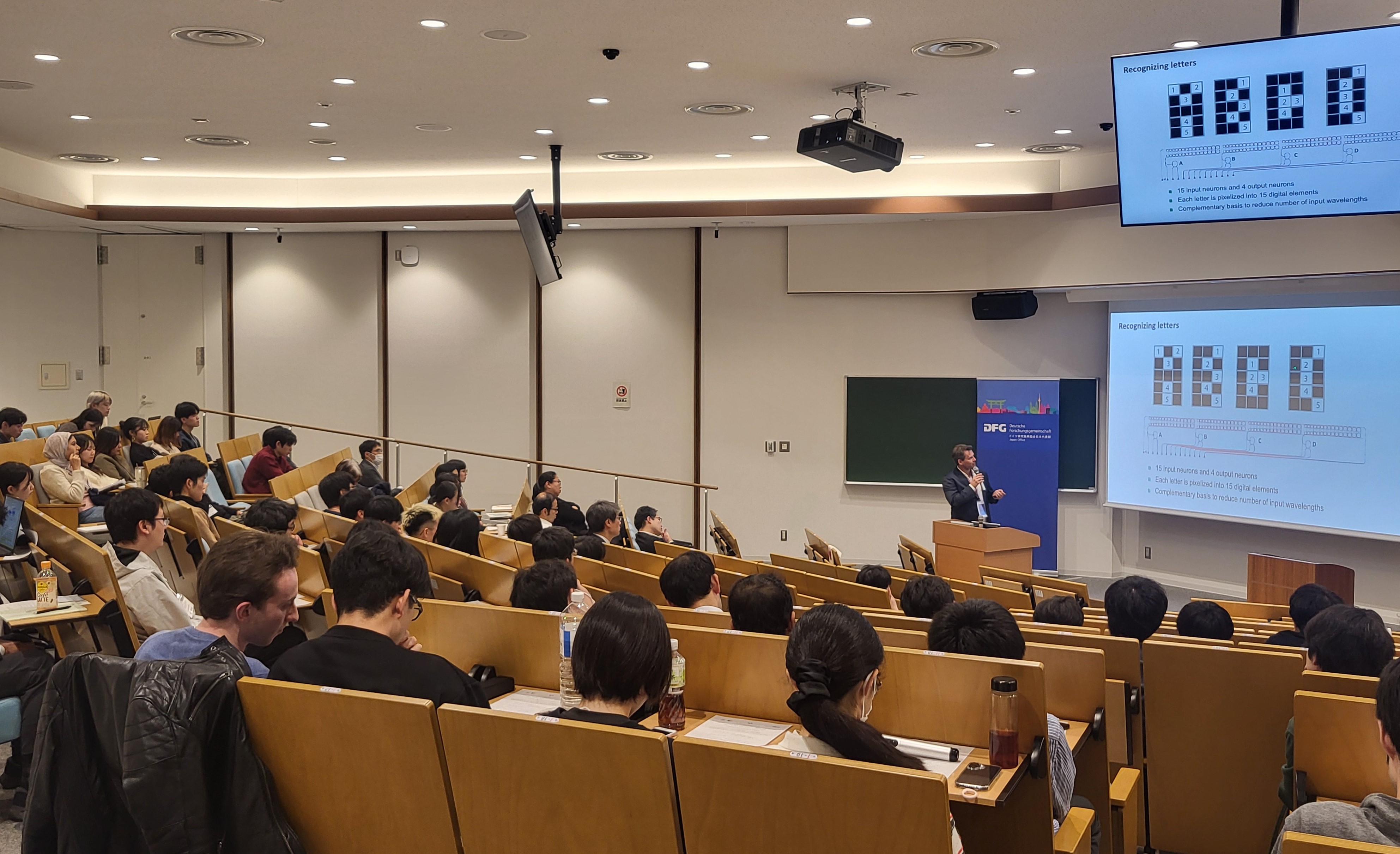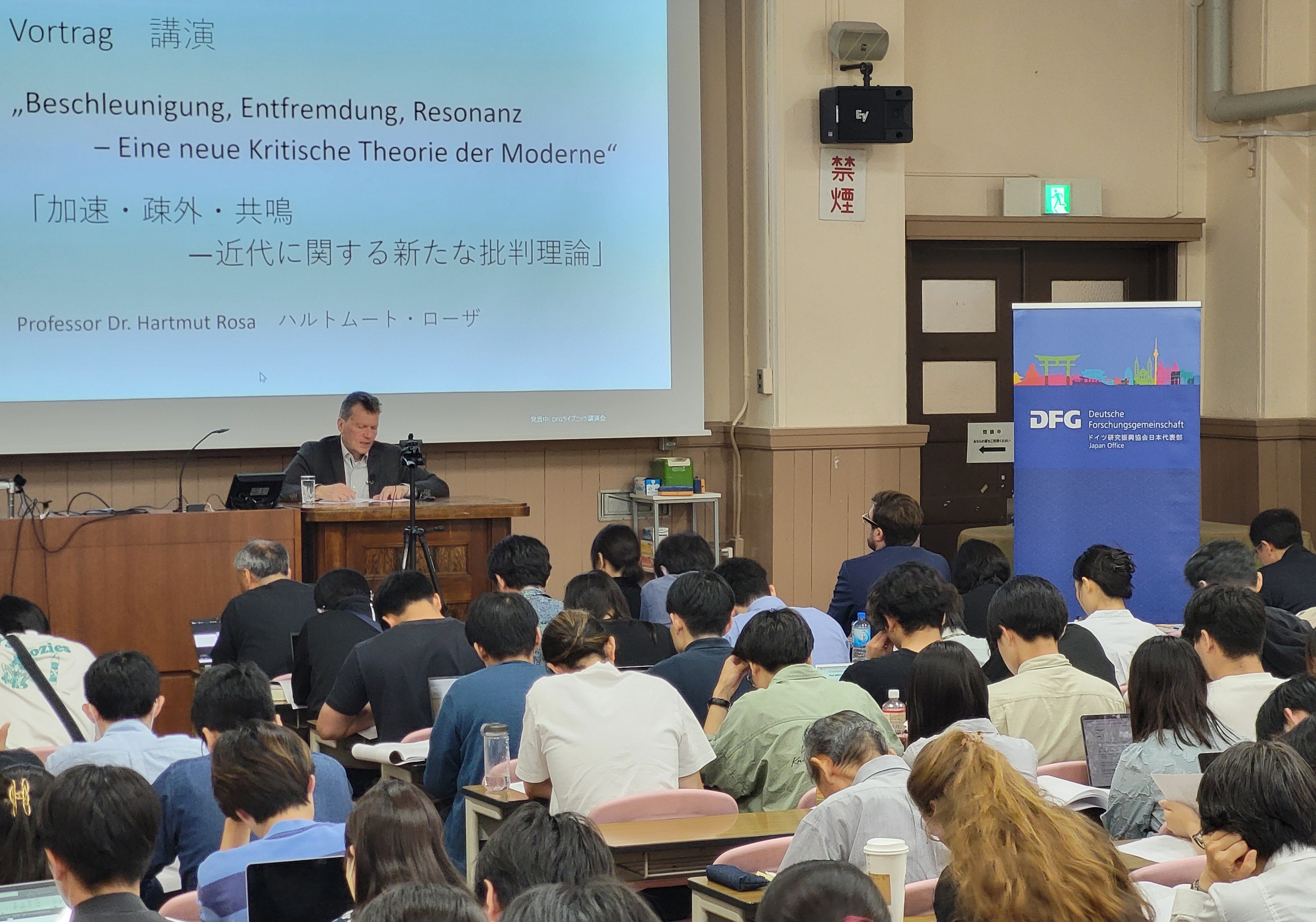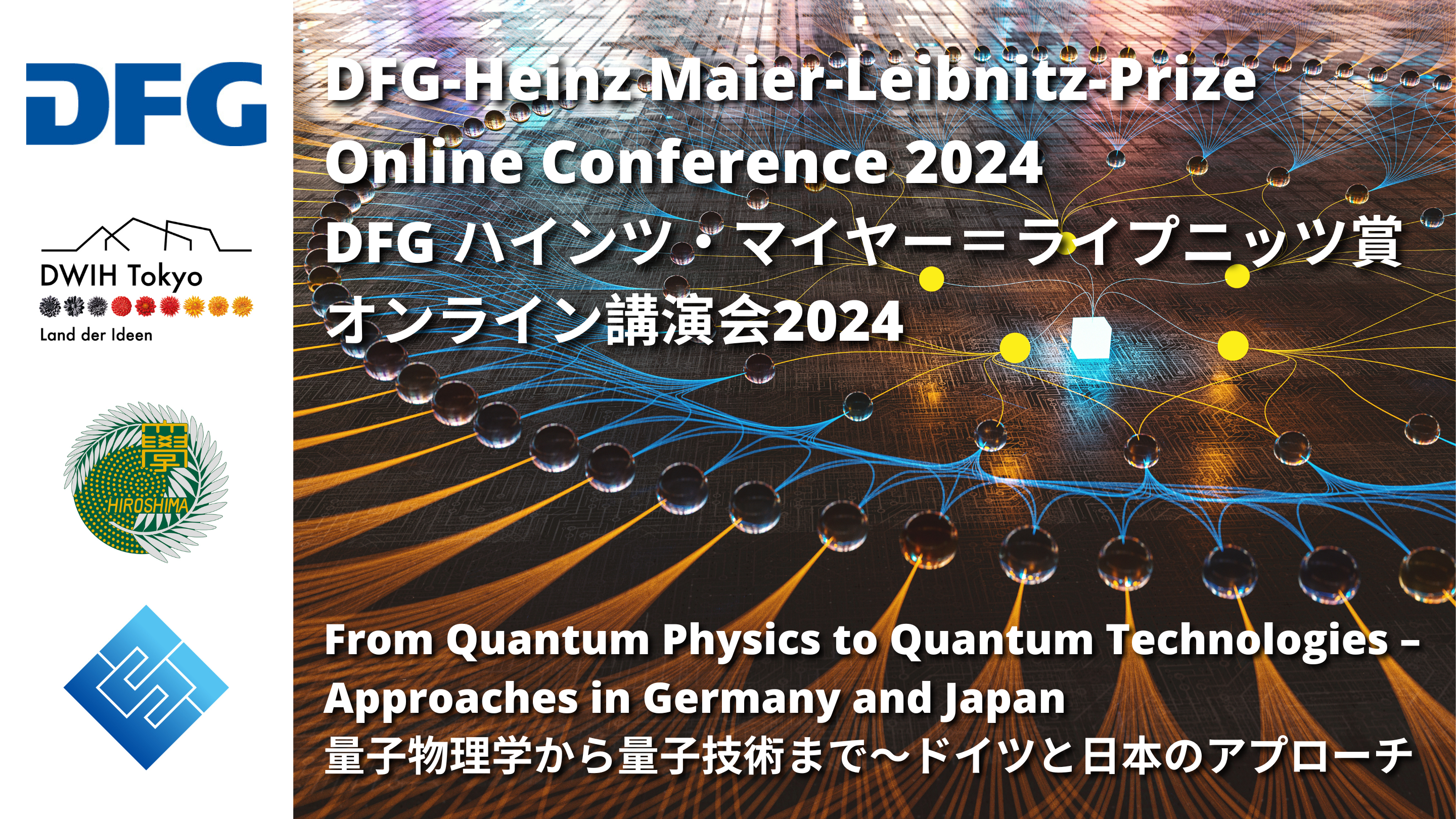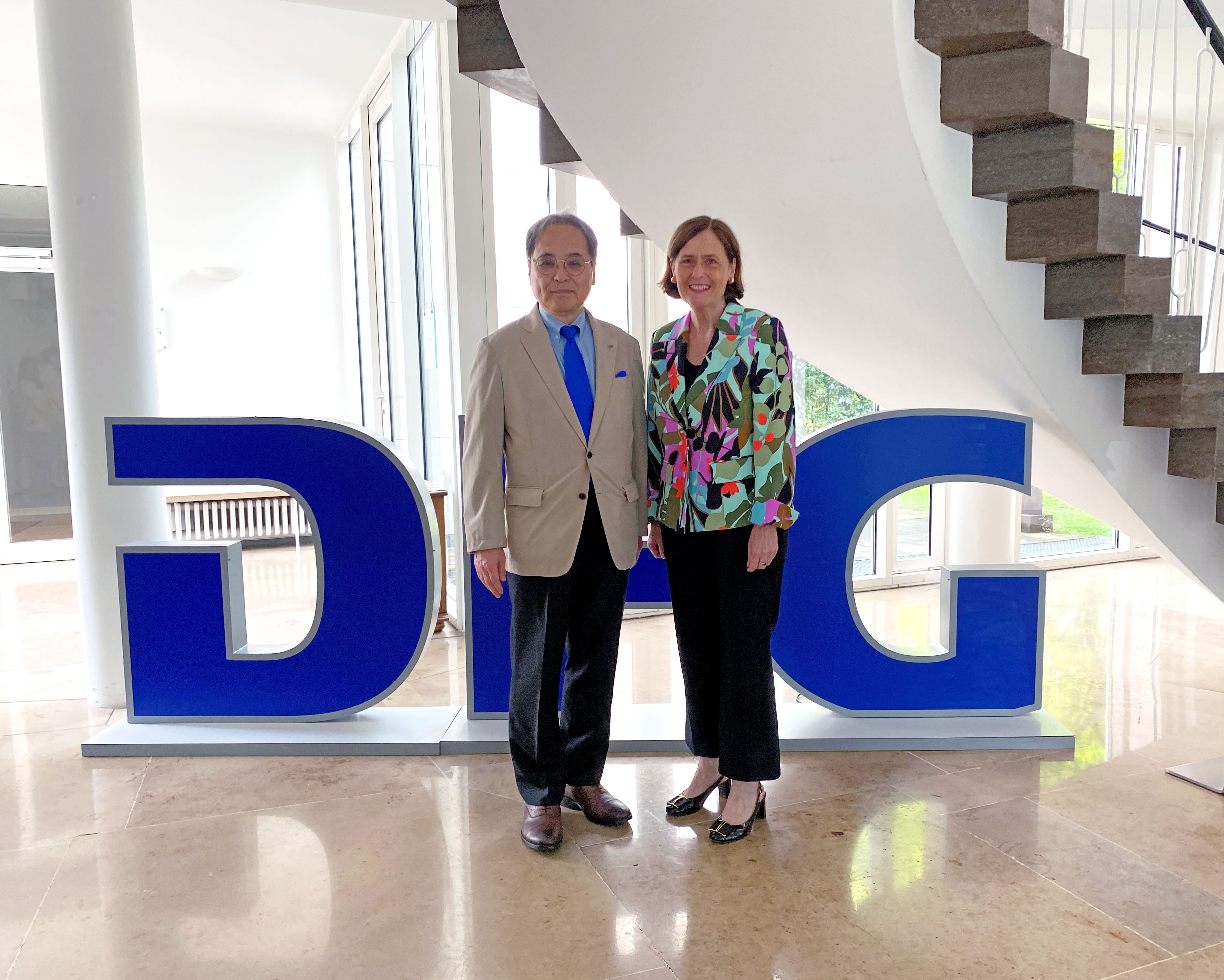Reports – Topics – News
DFG Leibniz Lectures in Tokyo and Kyoto
Leibniz Lecture in Osaka
© DFG
(20.11.25) Professor Dr. Wolfram Pernice, Gottfried Wilhelm Leibniz Prize laureate 2025, gave two lectures in Japan on the utilisation of photons in the development of sustainable computer hardware for AI. Read mor(interner Link)
DFG Leibniz Lectures in Tokyo and Kyoto
Leibniz Lecture at the University of Tokyo
© DFG
(12.08.25) In July 2025, Professor Dr. Hartmut Rosa gave his Leibniz Lectures on his theory of social acceleration at the University of Tokyo and at the Ritsumeikan University in Kyoto. Read mor(interner Link)
Funding Opportunity for Japanese-German Workshops and Research Visits

© Adobe Stock / touseef
(03.06.25) The DFG and Japan Society for the Promotion of Science (JSPS) provide a co-funding opportunity for Japanese-German workshops. Further Read mor(interner Link)
DFG President Katja Becker Meets with Japanese Ambassador
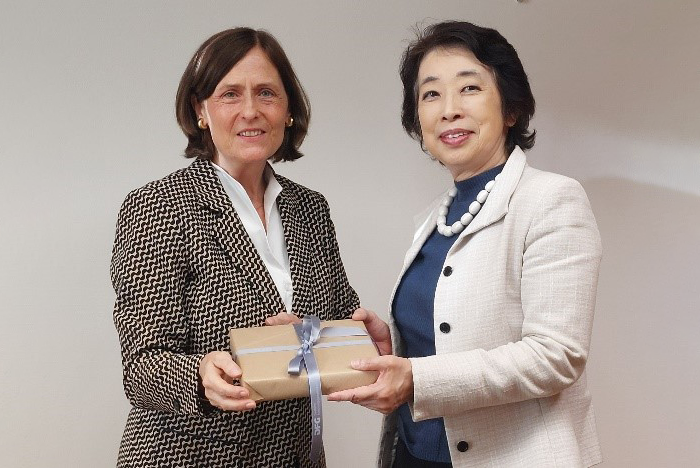
DFG President Professor Dr. Katja Becker and H.E. Mitsuko Shino, Ambassador of Japan in Berlin
© DFG
(09.04.25) On 3 April, DFG President Professor Dr. Katja Becker and H.E. Mitsuko Shino, Ambassador of Japan, met for talks at the Japanese Embassy in Berlin. The aim of the meeting was to get to know each other and exchange views on bilateral relations. Read mor(interner Link)
ASPIRE: Call for Proposals 2025 for Japanese Researchers and Funding of Two New Projects under Joint Call with the DFG

© AdobeStock / NickArt
(17.03.25) The DFG partner organisation Japan Science and Technology Agency (JST) has published a new call for proposals under the programme Adopting Sustainable Partnerships for Innovative Research Ecosystem (ASPIRE) to promote international exchange and researcher mobility. In addition, the DFG and JST are funding two new research projects in the field of quantum technologies under a joint call. Read mor(interner Link)
International Symposium on “Ethics in Information Technology and Robotics” in Kyoto
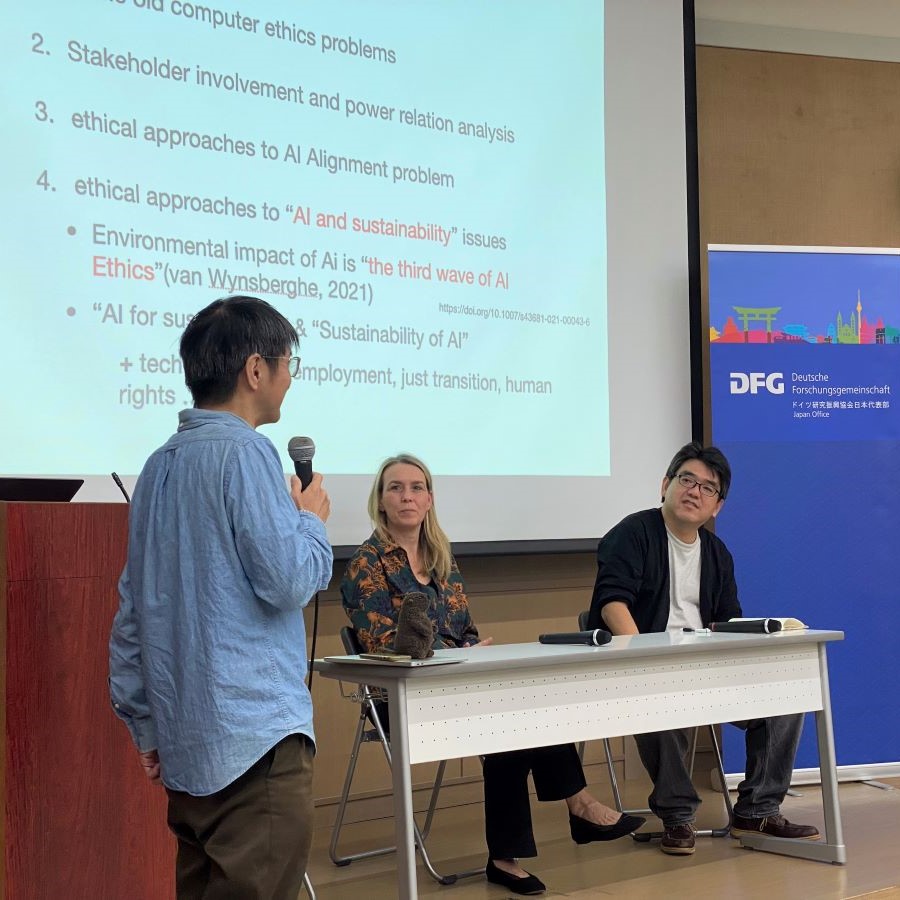
“Ethics in Information Technology and Robotics”

Opening address by Professor Yasuo Deguchi, Dean of the Graduate School of Letters and the Faculty of Letters at Kyoto University as well as Co-Chairperson of Kyoto Institute of Philosophy.
© CAPE
Opening address by Professor Yasuo Deguchi, Dean of the Graduate School of Letters and the Faculty of Letters at Kyoto University as well as Co-Chairperson of Kyoto Institute of Philosophy.
© CAPE
(16.12.2024) On 21 October, two experts from Japan and Germany shared insights from research and policy advice on ethics in the fields of robotics, information and communication technology as well as artificial intelligence (AI) at Kyoto University. During a discussion on aspects of national and international regulations of new technologies, the perspectives of ethics committees in both countries were elaborated. Read mor(interner Link)
Roundtable Discussion “Promoting Gender Equality in Academic Appointments”
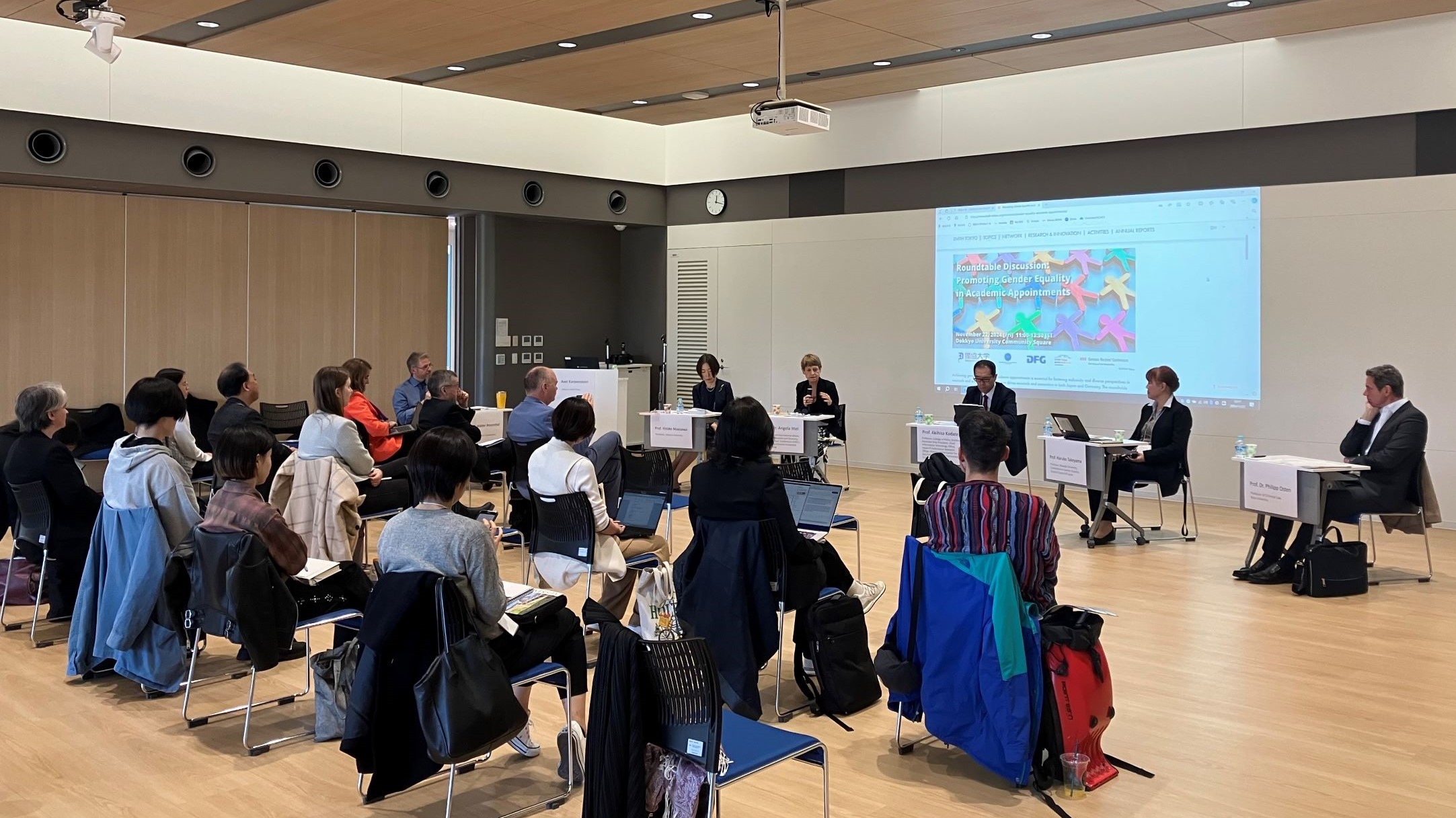
Impression of the roundtable discussion

Discussion with the roundtable participants: Professor Hiroko Maezawa, Professor Angela Ittel, Professor Akihisa Kodate, Professor Haruko Takeyama, Professor Philipp Osten (MC Axel Karpenstein).
© DFG
Discussion with the roundtable participants: Professor Hiroko Maezawa, Professor Angela Ittel, Professor Akihisa Kodate, Professor Haruko Takeyama, Professor Philipp Osten (MC Axel Karpenstein).
© DFG
(13.12.2024) Stakeholders of Japanese and German academic institutions discussed the current situation and challenges associated with gender equality in academic positions in both Japan and Germany. Read mor(interner Link)
Lecture Event in Tokyo with Professor Dr. Dr. Matthias Lutz-Bachmann on Kant’s Political Philosophy in Times of Globalisation
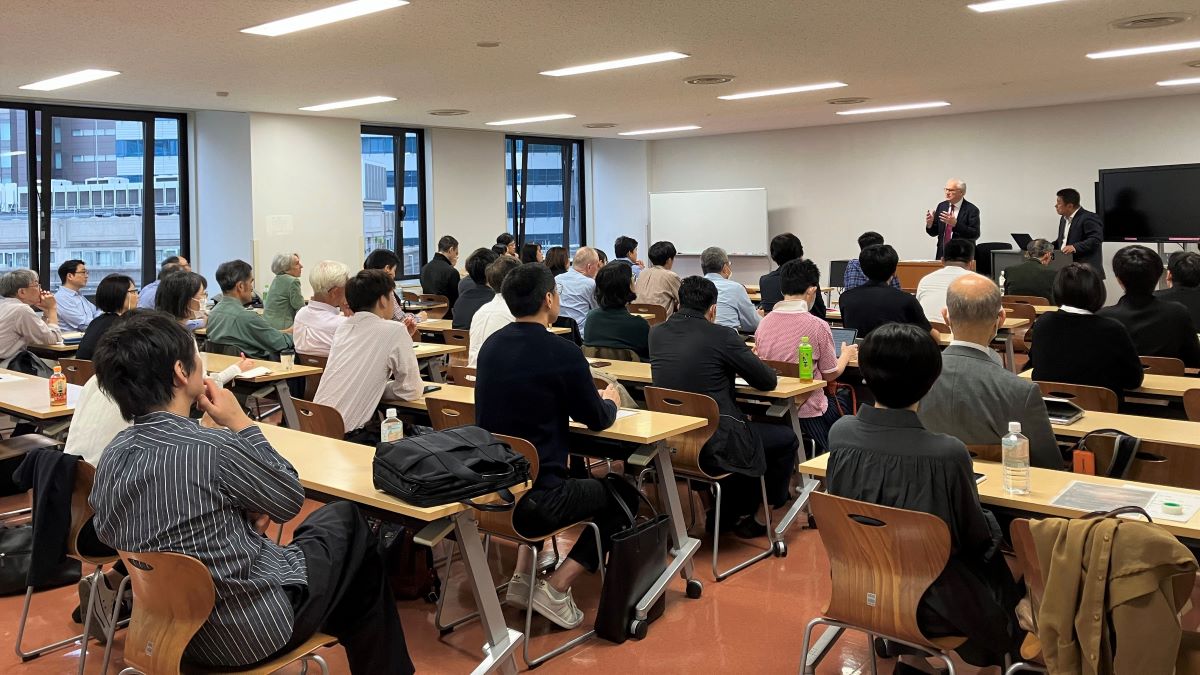
Impression of the event

Professor Dr. Dr. Matthias Lutz-Bachmann spoke about Kant’s political philosophy in times of globalisation.
© DFG
Professor Dr. Dr. Matthias Lutz-Bachmann spoke about Kant’s political philosophy in times of globalisation.
© DFG
(09.12.2024) Professor Dr. Dr. Matthias Lutz-Bachmann spoke about Kant’s political philosophy in times of globalisation on 26 October in Tokyo. During this event at Sophia University, students and researchers in all career phases discussed the possibility of peace in today’s world. Read mor(interner Link)
Heinz Maier-Leibnitz-Prize Online Conference 2024 "From Quantum Physics to Quantum Technologies – Approaches in Germany and Japan"
© DFG
(29.11.2024) In the emerging field of quantum technology two outstanding researchers from Japan and Germany presented their respective approaches in an online conference on 25 October. Together with further participants, Heinz Meier-Leibnitz prizewinner Dr. Tobias Meng and Dr. Haruna Katayama explored current ideas and questions related to the field in the discussion. The event can now be revisited on the DWIH Tokyo Youtube channel.
15th Anniversary of DFG Office Japan in Tokyo
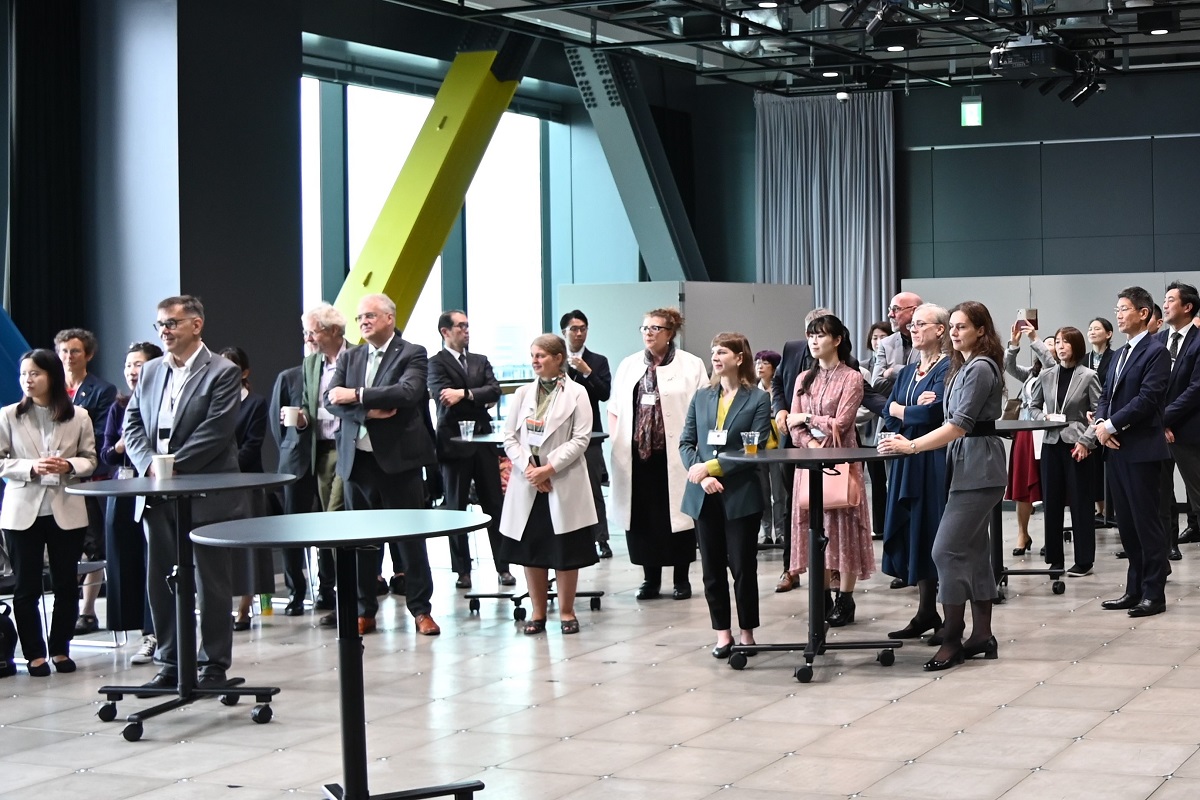
Guests at the reception to mark the 15th anniversary of the DFG Office Japan.
© DFG
(12.11.24) The DFG opened its office in Japan 15 years ago in response to keen interest within the German research communities in engaging in collaborations with Japanese partners. To celebrate this anniversary, the DFG hosted an event in Tokyo to enable representatives of partner organisations, universities and research institutes to gather for an informal exchange of ideas.
DFG President Katja Becker and Vice President Kerstin Schill Visit Kyoto
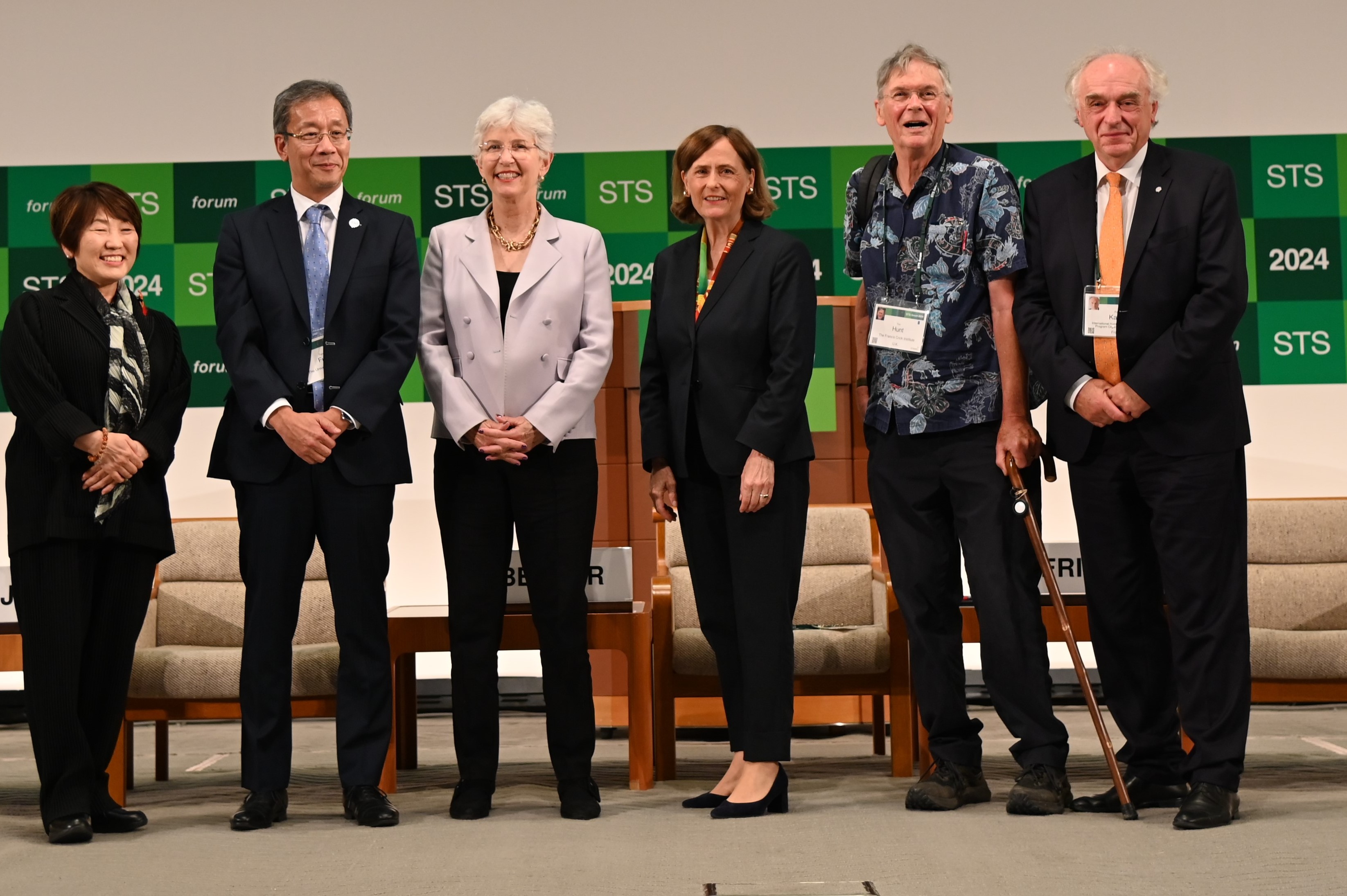
Participants of the panel “Basic Science, Innovation and Policy”: Toshiko Abe, Teruo Fujii, Cynthia Friend, Katja Becker, Tim Hunt and Pavel Kabat (from left to right).
© DFG
(04.11.24) A DFG delegation travelled to Japan at the beginning of October to attend the STS forum and take part in celebrations to mark the 50th anniversary of German-Japanese cooperation in the area of science and technology.
Kants politische Philosophie im Zeitalter der Globalisierung
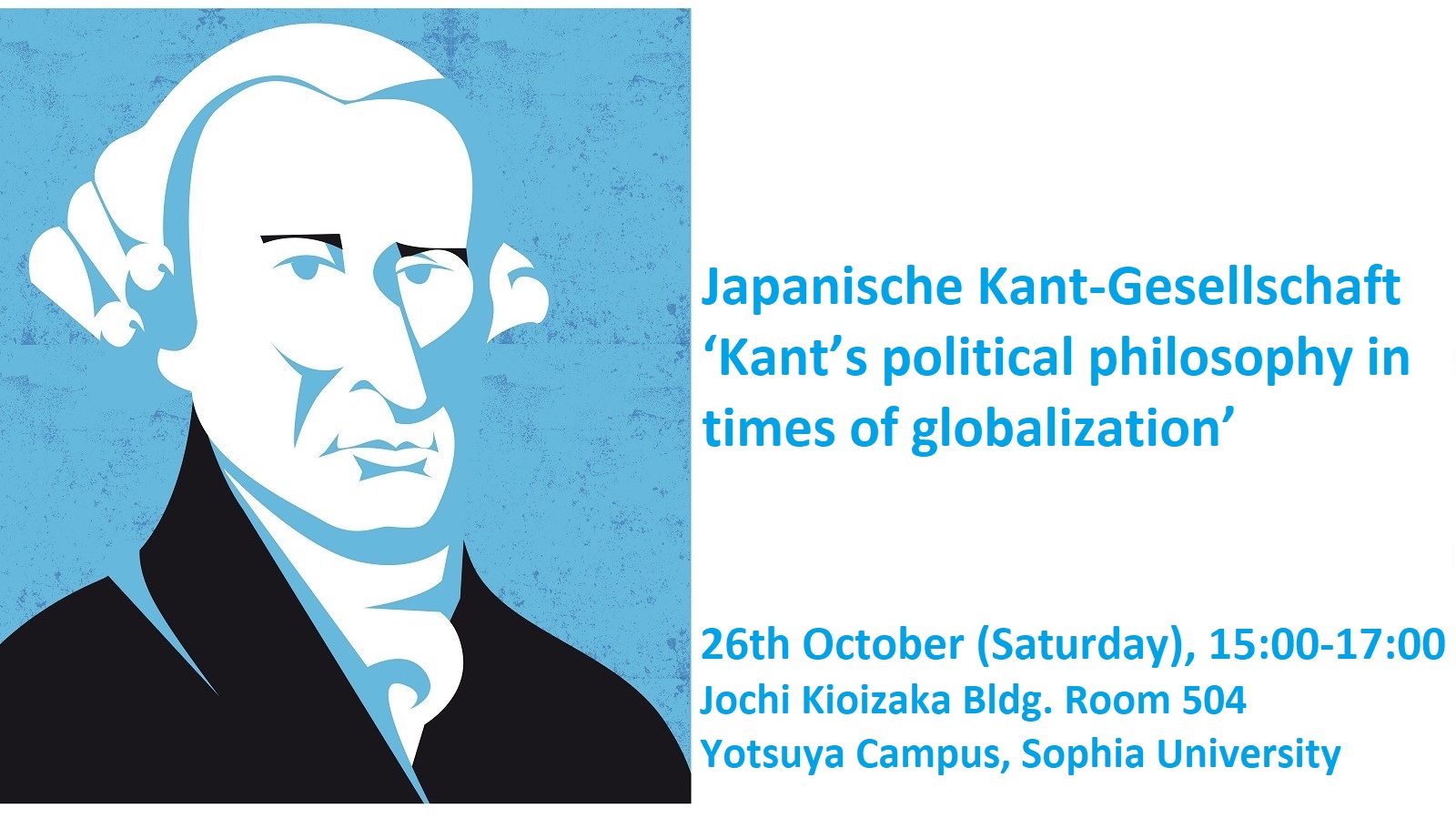
To commemorate the year of the 300th anniversary of Immanuel Kant’s birth Prof. Dr. Dr. Lutz-Bachmann will give a lecture in Tokyo on Kant’s political philosophy in times of globalization.
International Symposium on Ethics in Information Technology and Robotics
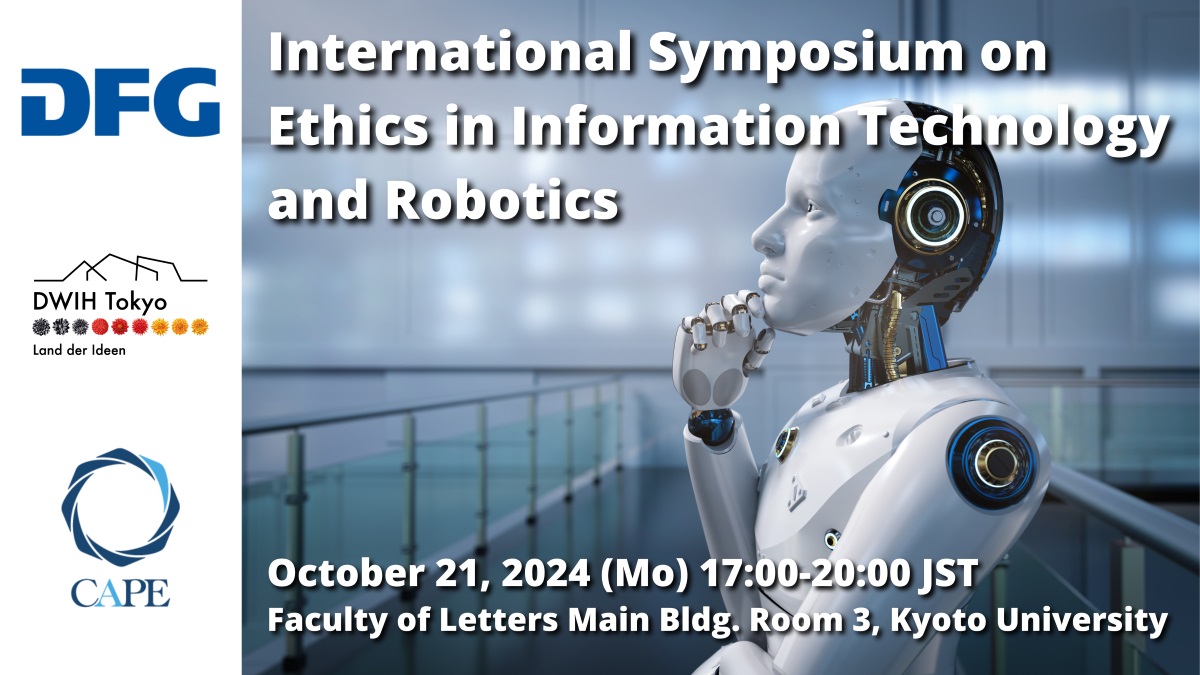
Two researchers from Germany and Japan discuss ethical implications of information technology and robotics on 21 October in Kyoto. In connection with a trilateral conference on "Generative AI: Pathways to Democratization, Transparency and Sustainability(externer Link) this event contributes to the international discourse in times of rapid global technical developments.
DFG-Heinz Maier-Leibnitz-Prize Online Conference 2024
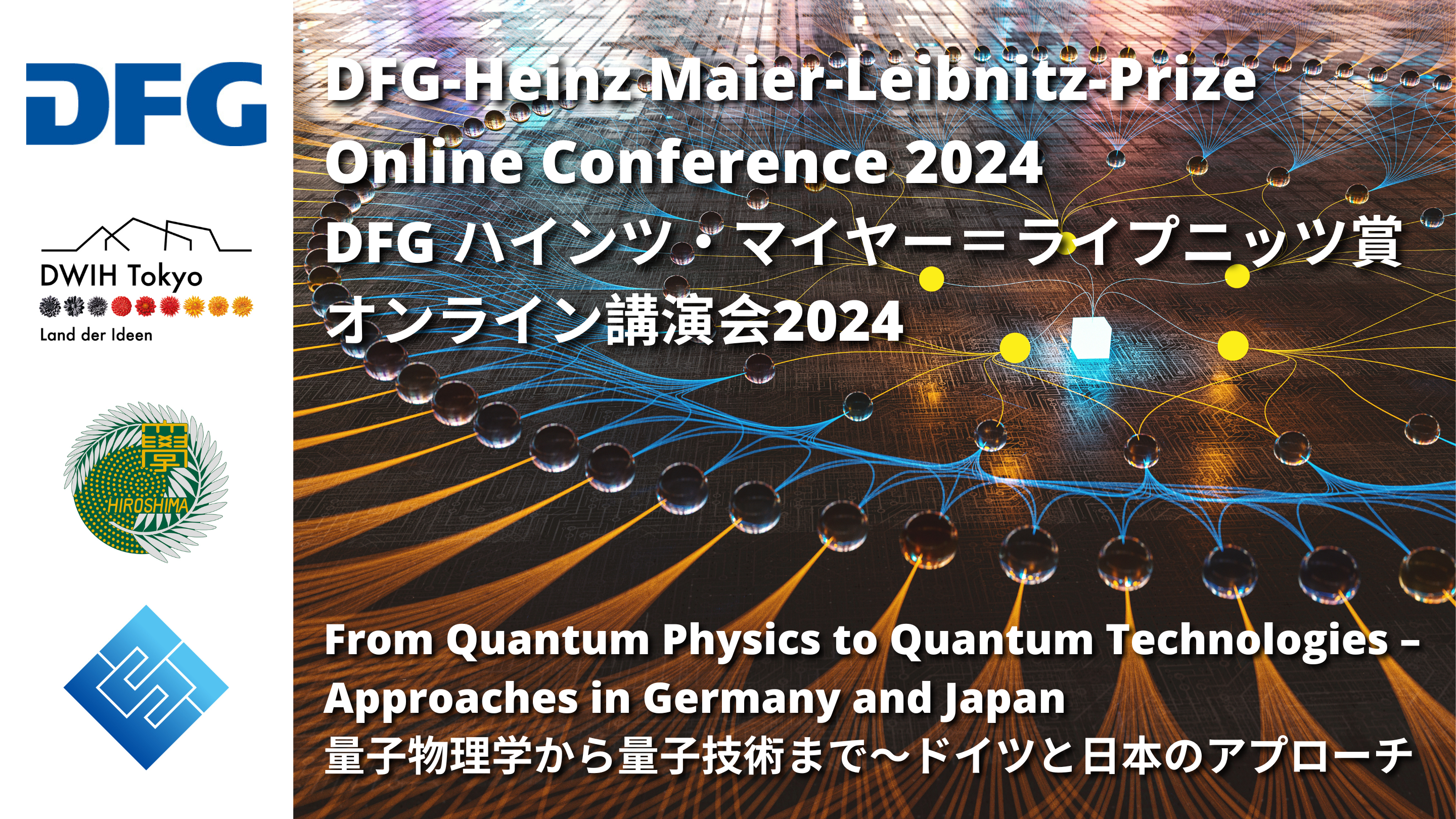
(21.08.24) DFG and DWIH Tokyo invite to a German-Japanese online conference about Quantum Physics and Quantum Technologies on 25th October. Heinz Maier-Leibnitz-Prize Winner of 2022 Dr. Tobias Meng at Technische Universität Dresden and Dr. Haruna Katayama at Hiroshima University will discuss their research and new approaches in both countries with the participants.
Workshop „Relationship in Human-Machine Interaction” in Tokyo

(16.07.24) Technological innovations were presented at a joint event organized by the DFG and the German House for Research and Innovation Tokyo.
Prof. Dr. Kazuhito Hashimoto visits the DFG
Prof. Dr. Kazuhito Hashimoto and Prof. Dr. Katja Becker
(11.07.24) The President of the Japan Science and Technology Agency (JST) Prof. Dr. Kazuhito Hashimoto was visiting the Deutsche Forschungsgemeinschaft (DFG) on 10 July and spoke with President Prof. Dr. Katja Becker about current topics in international cooperation. DFG and JST have a long-standing partnership. In addition to the joint funding of a large number of bilateral research projects, there is also a regular strategic exchange between the two organisations.
Funding opportunity for Japanese-German collaborations

© pro500 – stock.adobe.com
(07.06.24) New call for “Joint Seminars” published by JSPS.
JST-DFG 2024: Japanese-German Joint Call for Proposals on “Quantum Technologies”

© Sodapeaw – stock.adobe.com
(26.04.24) The Japan Science and Technology Agency (JST) and DFG jointly launched a call for proposals aiming at bilateral projects in Quantum Technologies.
Workshop “Relationship in Human-Machine Interaction”, Tokyo 14. März

(22.02.24) A joint event by DFG and the German Centre for Research and Innovation Tokyo (DWIH Tokyo) will highlight the potential of technology to support communication, decrease isolation, and enable new ways to organize work and life.
DFG Secretary General Dr. Heide Ahrens and Vice President Professor Dr. Peter Seeberger visit Japan
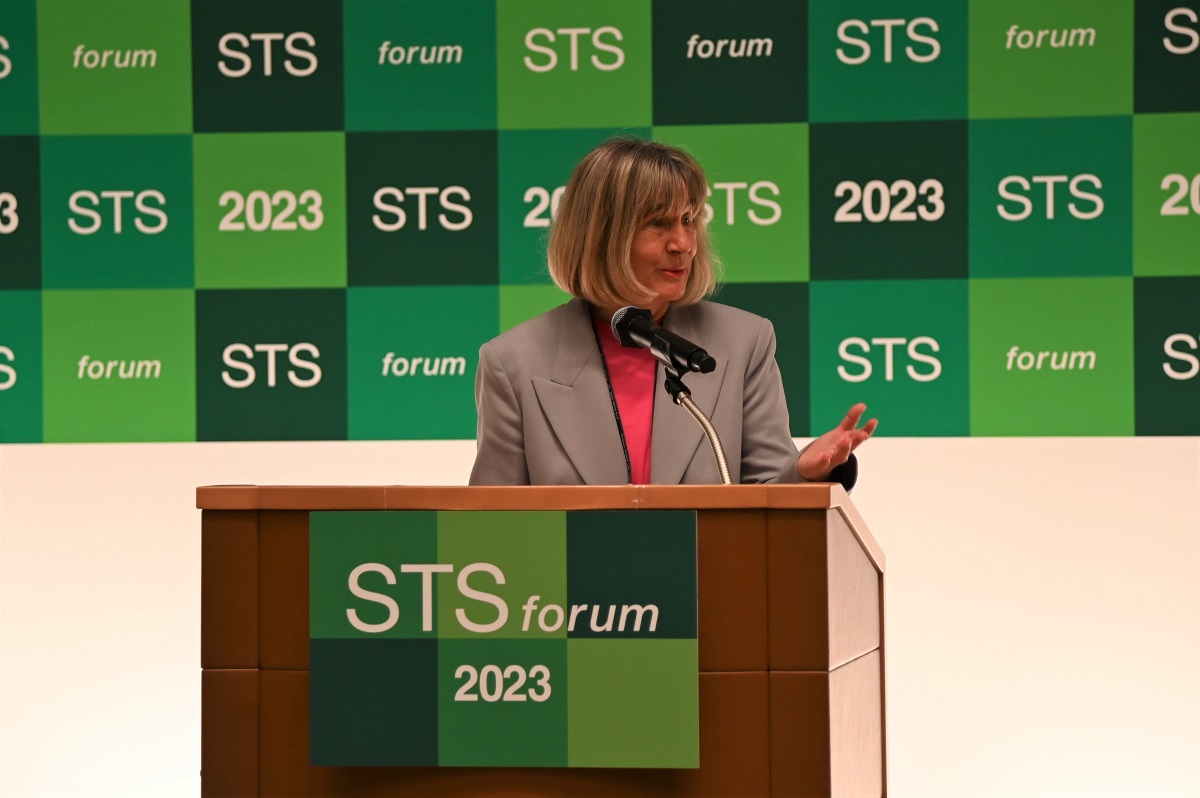
Secretary General Dr. Heide Ahrens at the FAPM
© DFG
(25.10.23) A DFG delegation with Secretary General Dr. Heide Ahrens and Vice President Professor Dr. Peter Seeberger travelled to Japan on the occasion of the 20th Science and Technology in Society forum in Kyoto. The delegation members met with policy makers, executives and researchers from over 120 countries and engaged in discussions with heads of 60 global funding agencies at the Funding Agency Presidents' Meeting. In Tokyo, they contributed to a podium discussion on “Converting the Chemical Industry into a Circular Economy” organised by the DFG, DWIH Tokyo and AHK Japan, and supported by RIKEN.
Funding opportunity for Japanese-German collaborations

Förderprogramm „ASPIRE“ von AMED
© Pixabay
(15.06.23) The DFG joins the funding program “ASPIRE” by JST and AMED. // New call for “Joint Seminars” published by JSPS.
Human-Machine Interaction and Responsibility
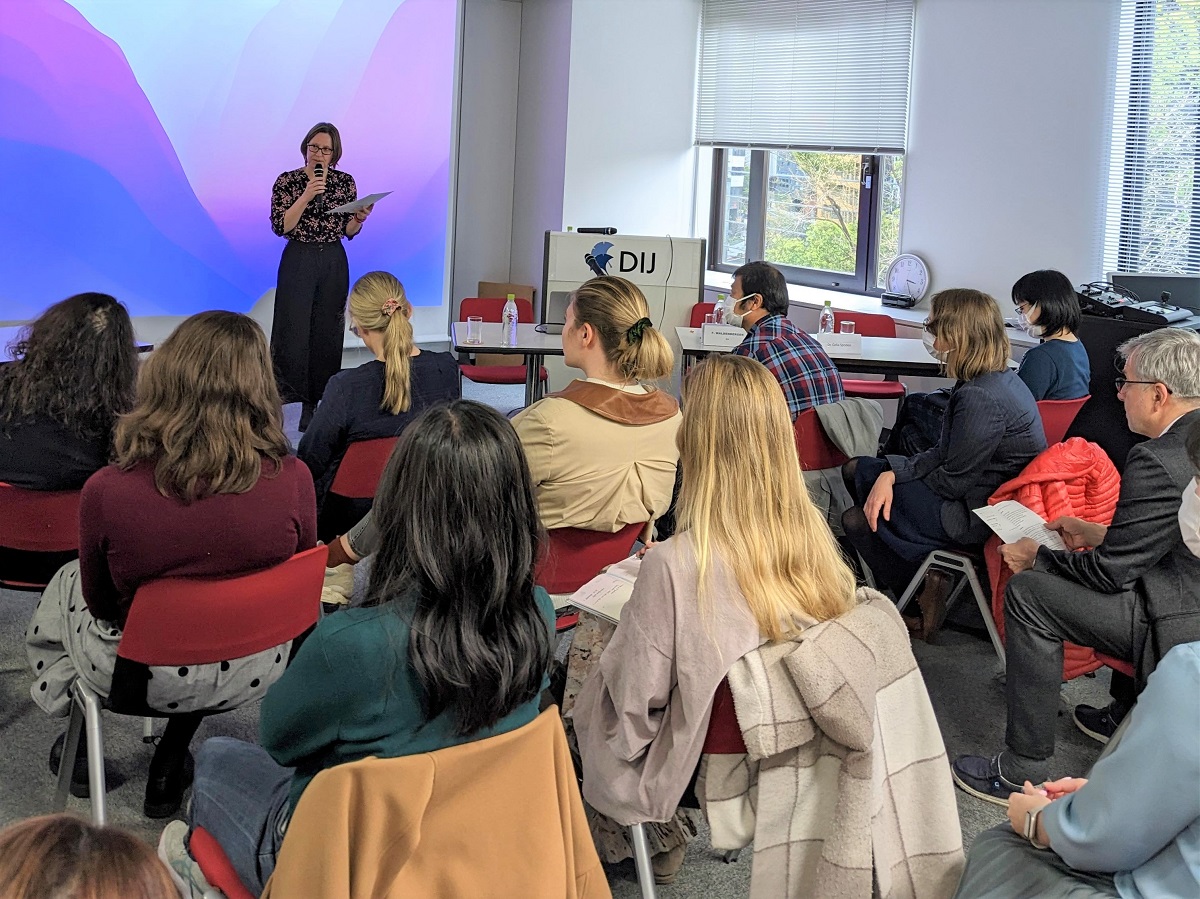
MC Dr Celia Spoden
© DFG
(17.04.23) Together with the German Institute for Japanese Studies (DIJ), and the German Centre for Research and Innovation (DWIH) Tokyo the DFG held an interdisciplinary workshop with experts from Japan and Germany on aspects of responsibility in contexts where humans interact with machines or AI based technology. Drawing from perspectives from technological development, psychology, philosophy, social sciences, literature and art studies the panel discussed questions such as “who is accountable for failures”, “who will be credited for achievements”, “what does it mean to be a human.”
